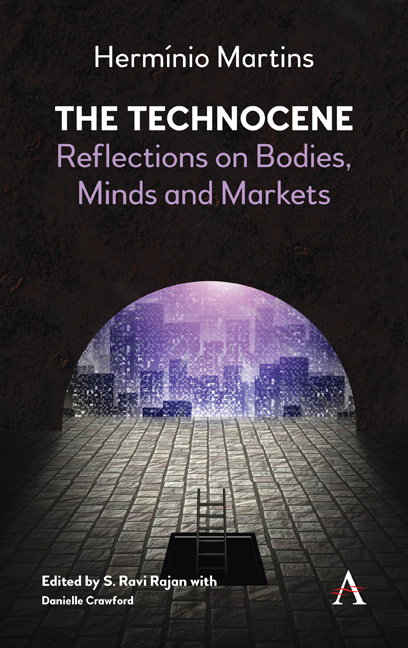Book contents
- Frontmatter
- Dedication
- Contents
- Preface
- Editor's Introduction: Hermínio Martins and the Technocene
- Chapter One The Technocene: On Bodies, Minds and Markets
- Chapter Two Technology Sublime: Paths to the Post-Human
- Chapter Three Perpetual Augmentation: From Eugenics to Human Genetic Capitalism
- Chapter Four The Body Vanishes! Momenta of Discarnation in Technoscience Today
- Chapter Five When Universities Become Body-Shops
- References
- Index
Preface
Published online by Cambridge University Press: 12 February 2019
- Frontmatter
- Dedication
- Contents
- Preface
- Editor's Introduction: Hermínio Martins and the Technocene
- Chapter One The Technocene: On Bodies, Minds and Markets
- Chapter Two Technology Sublime: Paths to the Post-Human
- Chapter Three Perpetual Augmentation: From Eugenics to Human Genetic Capitalism
- Chapter Four The Body Vanishes! Momenta of Discarnation in Technoscience Today
- Chapter Five When Universities Become Body-Shops
- References
- Index
Summary
Professor Herminio Martins (1934– 2015) was a leading light in British sociology and worked on a wide range of topics, including sociological theory, the philosophy of the social sciences, the sociology of science, the philosophy and sociology of technology and the historical sociology of Portugal and Brazil. He was widely feted and decorated. The Portuguese government conferred upon him the titles of Grande Oficial da Ordem do Infante Dom Henrique, Portugal (Grand Officer of the Order of Prince Henry the Navigator), and Grande Oficial da Ordem de Santiago e Espada, Portugal (Grand Officer of the Order of St. James), in investitures presided by the presidents of the Portuguese Republic at that time. He also received the Medalha de Merito Cultural da Camara Municipal de Cascais (Cultural Merit Medal from the Municipality of Cascais), near Lisbon, and in 2006, the University of Lisbon awarded him an honorary doctorate.
During Hilary term, 1990, while a graduate student at Oxford, I was privileged to attend a lecture series taught by Professor Martins. It was entitled, ‘The Theme of Technology in Philosophical Sociology’. It was a survey course, but it encompassed texts, people and ideas that were then, and even now, largely unknown and untaught. The lectures were sparsely attended and, if memory serves me right, only one other student, besides me, came regularly. However, Martins came to every session of the class formally attired in subfusc and, in his thick Portuguese accent, lectured as though there were a roomful of students. The classes were simply an intellectual feast and, without doubt, they formed the highlight of my experience as a graduate student at Oxford.
In the years since, I repeatedly asked Professor Martins about those lectures, and whether he would make the notes available. He always replied that he was working on writing them up as a book. He retired in 2001. We kept in touch casually, and I presented a paper to one of the conferences that produced festschrifts in his honour. However, it was not until mid-2014 that I received, via e-mail, a set of bulky attachments, along with a list of works he had written during the past decade. These papers were not his Oxford lectures, but the contents were gripping.
- Type
- Chapter
- Information
- The TechnoceneThe Technocene Reflections on Bodies, Minds and Markets, pp. ix - xPublisher: Anthem PressPrint publication year: 2018



